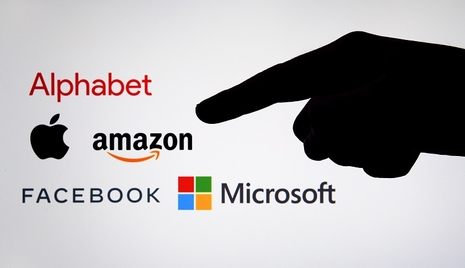Thirty-nine House Republicans joined over 200 of their Democrat peers to vote in support of legislation to strengthen enforcement against Big Tech, indicating that Americans are hungry for action to hold Big Tech accountable.
The State Antitrust Enforcement Venue Act would ensure that antitrust actions initiated by state attorneys general would stay in the jurisdiction they’re brought, instead of transferring to other court jurisdictions.
Under current law, antitrust actions are exempt from such transfers only if the federal government brings the cases, according to a summary of the bill.
The Northern District of California, which covers a slew of Big Tech companies, led all U.S. court jurisdictions for antitrust cases with almost 25 percent of federal antitrust cases filed in that district in 2021, according to an advisory by law firm Arnold & Porter. The Northern District of California has been the most active antitrust jurisdiction every year since 2009, according to Arnold & Porter.
The venue bill is geared toward opening up the possibility for more antitrust proceedings to be taken against Big Tech outside of the Northern District of California. “Big Tech gets to play in very favorable jurisdictions” when antitrust cases are brought against the industry, American Principles Project Policy Director Jon Schweppe said in an interview with MRC Free Speech America. “We see this as a big win for antitrust enforcement.”
But not all view the bill favorably.
Ryan Young, a senior fellow for the free-market Competitive Enterprise Institute who focuses on antitrust, said the bill – which is broadly written to cover industries outside of tech – could subject more industries than Big Tech to antitrust litigation, causing “mission creep.”
“It’s not just Big Tech that’s on Democrats’ hitlist. They also want to go after pharma, they want to go after live events, they want to go after hospitals,” Young said in an interview. “Even if you don’t care for Big Tech as a target, you need to be aware of the possibility of mission creep.”
R Street Institute Federal Affairs Manager Canyon Brimhall and Northeast Region Manager for Government Affairs Sarah Wall wrote in an op-ed that the bill would hurt courts’ efficiency by barring the combination of substantially similar antitrust lawsuits filed by states’ attorneys general, which is allowed under current law.
“This could lead to a situation in which all 50 states and the federal government are litigating the same case at the same time, creating a tangled web of litigation in courts across the country,” Wall and Brimhall wrote in the (Albany, N.Y.) Times-Union.
If courts reach different conclusions on the same case, it could still force the cases to be consolidated and litigated together anyway, which would nullify the bill's intended benefits, Brimhall wrote in an email to MRC Free Speech America.
But the bill’s sponsor, Rep. Ken Buck (R-CO), said the bill would aid competition and protect social media users from an unfair exercise of power by Big Tech.
“This is a major first step towards restoring competition and protecting American small businesses from the monopolistic conduct of Big Tech,” Buck wrote in an email to MRC Free Speech America. “The House voted on a broad bipartisan basis by a majority of nearly 60 votes to defend the free market in ideas and the free market in commerce.”
The measure passed the House 242-184, with 39 Republicans joining 203 Democrats in voting “yes.”
Notably, longtime antitrust skeptic and die-hard online censorship opponent Rep. Jim Jordan (R-OH), voted against the measure.
One high-profile tech antitrust case highlighted in Arnold & Porter’s advisory that happened in Northern California and largely boded in Big Tech’s favor was the September 2021 ruling in the Epic Games v. Apple case. Epic Games sued Apple after the phone maker banned Fortnite from its app store following Epic’s launch of its own in-app payment system that bypassed Apple’s system. The court held that Epic Games did not successfully demonstrate Apple was a monopolist because Apple had a market share of only 55 percent in digital mobile gaming transactions, and there was no evidence of barriers to entry, output reductions or decreased innovation.
Another 2021 ruling largely favorable for the tech industry occurred when the United States Court of Appeals for the Ninth Circuit ruled against a lower court order that certified a class-action lawsuit involving 250 million people. Purchasers of certain Qualcomm phones filed the suit over the company’s alleged monopoly of modern cellphone chips. The Ninth Circuit covers several states, including California, where Qualcomm is headquartered.
In FTC vs. Qualcomm, the Federal Trade Commission accused the company’s licensing agreements of being anticompetitive, due to its practices reportedly excluding competition and harming other chipmakers. The Ninth Circuit appeals court ultimately held that “differences in relevant state law” meant that a district court order certifying formation of a class had to be vacated, according to Bloomberg Law.
The State Antitrust Enforcement Venue Act now goes to the Senate for consideration.
Conservatives are under attack. Contact your representatives and demand that Big Tech be held to account to mirror the First Amendment.






